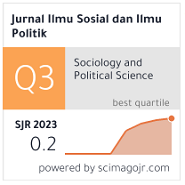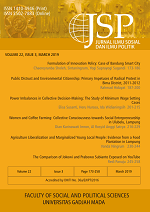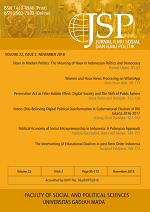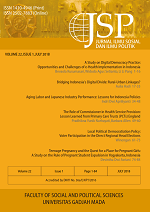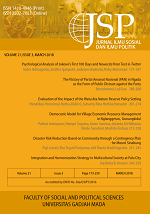Polarization of Indonesian Society during 2014-2020: Causes and Its Impacts toward Democracy
Wasisto Raharjo Jati(1*)
(1) Research Centre for Politics, Indonesian National Research and Innovation Agency, Indonesia
(*) Corresponding Author
Abstract
Polarization was widely used in a large number of publications on Indonesian political studies from 2014 to 2020. This term particularly refers to the divisive society condition because of different political preferences. Previously, polarization is rare to use to frame Indonesian electoral competition since both parties and candidates counted on ideological spectrum. Since the personalization of politics have been flourishing recently, it drives identity to be marker when it comes to evaluating the candidates. This condition, consequently, makes the election is not merely political competition for power but emotional competition for lives. For the last six years, there were three major elections, including the 2014 Presidential Election, 2017 Jakarta Gubernatorial Election, and 2019 Presidential Election. These three elections had a significant factor in polarizing society at that given time. They specifically referred to the two leading figures that represented the two stark political identity symbols. However, after 2018, the polarization of society itself seemed under control since the ruling regime coalitions and their social groups and allies worked together. It was meant to manage the effect of polarization and also to corner the opposition groups. While the clashes of views still exist, the situation would be worse if the 3 elections had not happened.
Keywords
Full Text:
PDFReferences
Aji, N., & Dartanto, T. (2018). Behind the Jokowi’s victory: Did economic voting matter in the 2014 Indonesian presidential election? Asia-Pacific Journal of Regional Science, 2(1), 115–138. https://doi.org/10.1007/s41685-018-0083-3
Aspinall, E. (2005). Elections and the normalization of politics in Indonesia. South East Asia Research, 13(2), 117–156. JSTOR.
Aspinall, E. (2011). Democratization and Ethnic Politics in Indonesia: Nine Theses. Journal of East Asian Studies, 11, 289–319. https:// doi.org/10.1017/S15982
Aspinall, E., Fossati, D., Muhtadi, B., & Warburton, E. (2020). Elites, masses, and democratic decline in Indonesia. Democratization, 27(4), 505–526. https:// doi.org/10.1080/13510347.2019.1680971
Aspinall, E., & Mietzner, M. (2019). Indonesia’s Democratic Paradox: Competitive Elections amidst Rising Illiberalism. Bulletin of Indonesian Economic Studies, 55(3), 295–317. https://doi.org/10.1080/00074918.2019.1690412
Barry, B. (1975). Political Accommodation and Consociational Democracy. British Journal of Political Science, 5(4), 477–505.
Baswedan, A. R. (2007). Indonesian Politics in 2007: The Presidency, Local Elections and the Future of Democracy. Bulletin of Indonesian Economic Studies, 43(3), 323–340. https://doi.org/10.1080/00074910701727597
Druckman, J. N., & Levendusky, M. S. (2019). What Do We Measure When We Measure Affective Polarization? Public Opinion Quarterly, 83(1), 114–122. https://doi. org/10.1093/poq/nfz003
Fossati, D. (2019a). The Resurgence of Ideology in Indonesia: Political Islam, Aliran and Political Behaviour. Journal of Current Southeast Asian Affairs, 38(2), 119–148. https://doi.org/10.1177/1868103419868400
Fossati, D. (2019b). Electoral reform and partisan dealignment in Indonesia. International Political Science Review. https://doi.org/10.1177/0192512119826389
Fossati, D., Aspinall, E., Muhtadi, B., & Warburton, E. (2020). Ideological representation in clientelistic democracies: The Indonesian case. Electoral Studies, 63. https://doi.org/10.1016/j.electstud.2019.102111
Freeman, S. (2020). Democracy, Religion & Public Reason. Daedalus, 149(3), 37–58.
Harteveld, E. (2019, September 29). Affective polarization and social sorting: A comparative study. APSA Annual Meeting, Washington D.C. http://www.eelcoharteveld.nl/publications/
Iyengar, S., Lelkes, Y., Levendusky, M., Malhotra, N., & Westwood, S. J. (2019). The Origins and Consequences of Affective Polarization in the United States. Annual Review of Political Science, 22(1), 129–146. https://doi.org/10.1146/annurev-polisci-051117-073034
Jayasuriya, K. (2020). The Rise of the Right. Southeast Asian Affairs, 43–56.
Kenny, P. (2017). Populism and Patronage: Why Populists Win Elections in India, Asia, and Beyond. Oxford: Oxford University Press.
Lauka, A., McCoy, J., & Firat, R. B. (2018). Mass Partisan Polarization: Measuring a Relational Concept. American Behavioral Scientist, 62(1), 107–126. https://doi. org/10.1177/0002764218759581
Mietzner, M. (2019). Authoritarian innovations in Indonesia: Electoral narrowing, identity politics and executive illiberalism. Democratization, 1–16. https://doi.org/10.1080/13510347.2019.1704266
Mietzner, M. (2020). Populist Anti- Scientism, Religious Polarisation, and Institutionalised Corruption: How Indonesia’s Democratic Decline Shaped Its COVID-19 Response. Journal of Current Southeast Asian Affairs, 39(2), 227–249. https://doi.org/10.1177/1868103420935561
Mietzner, M., & Muhtadi, B. (2018a). Explaining the 2016 Islamist Mobilisation in Indonesia: Religious Intolerance, Militant Groups and the Politics of Accommodation. 42(3), 479–497. https://doi.org/10.1080/10357823.2018.1473335
Mietzner, M., & Muhtadi, B. (2018b). Explaining the 2016 Islamist Mobilisation in Indonesia: Religious Intolerance, Militant Groups and the Politics of Accommodation. Asian Studies Review, 42(3), 479–497. https://doi.org/10.1080/10357823.2018.1473335
Muhtadi, B., & Warburton, E. (2020). Inequality and Democratic Support in Indonesia. Pacific Affairs, 93(1), 31–58.
Mujani, S., & Liddle, W. (2004). Indonesia’s Approaching Elections: Politics, Islam, and Public Opinion. Journal of Democracy, 15(1), 109–123.
Mujani, S., & Liddle, W. (2010). Indonesia: Personalities, Parties, and Voters. Journal of Democracy, 21(2), 35–49.
Reiljan, A. (2019). ‘Fear and loathing across party lines’ (also) in Europe: Affective polarisation in European party systems. European Journal of Political Research, n/a(n/a). https://doi.org/10.1111/1475-6765.12351
Rogowski, J. C., & Sutherland, J. L. (2016). How Ideology Fuels Affective Polarization. Political Behavior, 38(2), 485–508. https://doi.org/10.1007/s11109-015-9323-7
Setijadi, C. (2021). The Pandemic as Political Opportunity: Jokowi’s Indonesia in the Time of Covid-19. Bulletin of Indonesian Economic Studies, 57(3), 297–320. https://doi.org/10.1080/00074918.2021.2004342
Storslee, M. (2019). Religious Accommodation, the Establishment Clause, and Third- Party Harm. The University of Chicago Law Review, 86(4), 871–944.
Webster, S. W., & Abramowitz, A. I. (2017). The Ideological Foundations of Affective Polarization in the U.S. Electorate. American Politics Research, 45(4), 621–647. https://doi.org/10.1177/1532673X17703132
Ziblatt, D. (2021). ”V-Dem [Indonesia/2014-2020] Dataset v11.1” Varieties of Democracy Project. Country Graph. https://www.v-dem.net/en/analysis/CountryGraph/
Article Metrics
Refbacks
- There are currently no refbacks.
Copyright (c) 2022 Jurnal Ilmu Sosial dan Ilmu Politik

This work is licensed under a Creative Commons Attribution-NonCommercial-NoDerivatives 4.0 International License.







